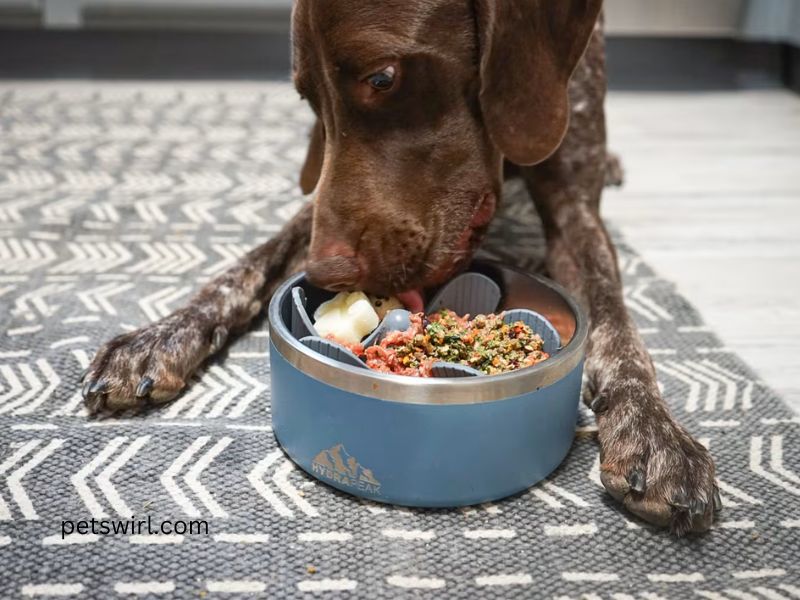Garlic is a common ingredient in many kitchens worldwide, known for its flavor and potential health benefits for humans. However, when it comes to canine companions, many pet owners ask, “Can dogs have garlic?” This article dives deep into the risks associated with garlic consumption in dogs, the symptoms of garlic toxicity, and safer alternatives to ensure your furry friend’s health and well-being.
Garlic Toxicity in Dogs
Can dogs have garlic without any adverse effects? Unfortunately, the answer is no. Garlic, a member of the Allium family, which includes onions, leeks, and chives, contains thiosulfate, a compound that can be harmful to dogs. Unlike humans, dogs are more sensitive to thiosulfate, making garlic potentially toxic. When dogs consume garlic, it can damage their red blood cells, leading to a condition known as hemolytic anemia. This condition can prevent red blood cells from carrying enough oxygen throughout the body, resulting in fatigue and other serious health complications.
The risk of garlic toxicity in dogs increases with the amount consumed. So, can dogs have garlic in small quantities? Even small amounts of garlic, when ingested repeatedly or in high concentrations, can lead to serious health problems. Garlic powder and garlic supplements can also pose a danger if used as a dog food ingredient, making it crucial to understand why garlic is not considered safe for canine consumption.
Is Garlic Bad for Dogs?
Many pet owners still wonder, “Can dogs have garlic?” There is a common misconception that garlic can be used to boost a dog’s immune system or repel fleas. While garlic does have some health benefits for humans, its effects on dogs are vastly different. Veterinarians generally advise against feeding garlic to dogs, citing its harmful properties. Research has shown that even small doses of garlic can lead to garlic toxicity in some dogs, particularly smaller breeds or those with pre-existing health conditions.
The belief that garlic can act as a natural flea repellent in dogs is a myth. So, can dogs have garlic as a flea remedy? The truth is, there is no scientific evidence to support the idea that garlic can effectively prevent fleas. On the contrary, the risks associated with garlic consumption far outweigh any perceived benefits. When garlic is given to dogs in any form, including fresh, cooked, or powdered, it can lead to severe health issues. Therefore, it is crucial for pet owners to understand that garlic is indeed bad for dogs.
Symptoms of Garlic Poisoning in Dogs
If you’re still asking, “Can dogs have garlic without showing any symptoms?”—recognizing the signs of garlic poisoning is essential for pet owners who suspect their dog has ingested garlic. Symptoms may not appear immediately and can take several days to manifest. Common signs of garlic poisoning in dogs include:
- Vomiting
- Diarrhea
- Lethargy
- Abdominal pain
- Pale or yellowish gums
- Increased heart rate
- Weakness
- Loss of appetite
- Dark-colored urine
The severity of the symptoms often depends on the amount of garlic consumed and the size of the dog. For instance, smaller dogs or those with underlying health conditions are at a higher risk of developing severe symptoms, even with minimal garlic ingestion. If you are still contemplating “can dogs have garlic?” it is important to realize that the potential risks far outweigh any questionable benefits. If a dog exhibits any of these symptoms, it is essential to seek veterinary assistance promptly, as untreated garlic toxicity can lead to life-threatening conditions.
Garlic and Dog Diet: Myths and Facts
Given the many discussions on “Can dogs have garlic,” it’s important to address the myths versus the facts. Garlic’s supposed health benefits for dogs have been widely discussed, leading to various myths that it is a beneficial supplement. Some pet owners believe that garlic can enhance a dog’s immune system, improve cardiovascular health, or act as a flea repellent. However, these claims lack substantial scientific backing. While garlic has proven health benefits for humans, it does not translate similarly to dogs.
The idea that garlic is safe for dogs is largely based on anecdotal evidence rather than clinical research. So, can dogs have garlic as part of a healthy diet? The toxic nature of garlic is well-documented in veterinary studies, indicating that its potential benefits do not outweigh the risks. Feeding garlic to dogs, even in small doses, can lead to negative health outcomes. For pet owners who wish to incorporate natural supplements into their dog’s diet, there are safer options than garlic.
Also read: Can Dogs Eat Olives?
Garlic Alternatives for Dogs
For those still pondering “Can dogs have garlic safely,” it’s worth noting that there are several natural herbs and supplements that can offer health benefits without the associated risks. These alternatives can provide similar advantages as garlic without toxicity concerns. Some of the safer garlic alternatives for dogs include:
- Parsley: Rich in vitamins and antioxidants, parsley can help freshen a dog’s breath and support overall health. It is a much safer option than garlic when looking for a natural herb for dogs.
- Turmeric: Known for its anti-inflammatory properties, turmeric can be used to support joint health and reduce inflammation. It is a popular supplement in canine diets and considered safe in appropriate amounts.
- Ginger: Offering digestive benefits, ginger can help soothe upset stomachs in dogs. It is a much safer choice compared to garlic for addressing digestive health.
- Coconut Oil: This natural supplement can support skin and coat health while also promoting a healthy digestive system.
So, can dogs have garlic alternatives that are safe? Yes, choosing these options allows pet owners to provide their dogs with natural health benefits without the dangers associated with garlic consumption.
Safe Human Foods for Dogs
While contemplating “Can dogs have garlic,” it’s helpful to know that many human foods are safe and beneficial for dogs. Including these safe foods in a dog’s diet can offer nutritional value without posing health risks. Some safe human foods for dogs include:
- Carrots: Great for dental health and low in calories, making them an ideal treat.
- Pumpkin: Helps with digestion and can alleviate constipation or diarrhea.
- Blueberries: Packed with antioxidants that support immune health.
- Sweet Potatoes: Rich in fiber and vitamins, these make a healthy addition to a dog’s diet.
- Apples (without seeds): Provide vitamins A and C and are low in fat.
If you’re asking, “Can dogs have garlic while these foods are available?” the answer is clearly no. It’s important to introduce any new food gradually and in moderation. These human foods are generally safe for dogs, but it’s always wise to consult a veterinarian before adding anything new to a dog’s diet.
How Much Garlic is Toxic to Dogs?
Many wonder “Can dogs have garlic in any amount?” The answer largely depends on factors like the dog’s size, breed, and overall health. Generally, consuming as little as 1 gram of garlic per kilogram of body weight can cause negative effects. For example, a medium-sized dog weighing 20 kilograms could potentially be affected by ingesting just 20 grams of garlic.
Since garlic powder is more concentrated than fresh garlic, even smaller quantities can be dangerous. So, when it comes to “Can dogs have garlic in powdered form,” the risks are even higher. It is advisable for dog owners to avoid garlic altogether and not take any chances with dosage calculations.

Treatment for Dogs Who Ate Garlic
If you find yourself asking “Can dogs have garlic and what should I do if they accidentally eat it?”—immediate action is necessary to minimize potential health risks. The first step is to assess the amount of garlic consumed and the dog’s symptoms. If garlic poisoning is suspected, contacting a veterinarian or pet poison helpline should be the top priority.
In cases where the ingestion was recent, the veterinarian may induce vomiting to prevent the absorption of toxins. Activated charcoal may also be administered to absorb any remaining toxins in the gastrointestinal tract. If the dog is exhibiting symptoms of anemia, blood tests may be conducted, and a blood transfusion could be necessary in severe cases.
So, can dogs have garlic and not require medical attention afterward? Given the potential dangers, prompt treatment is vital to improve the prognosis, and it’s not worth taking any risks.
Garlic in Dog Treats and Supplements
Some commercial dog treats and supplements contain garlic in small amounts, leading to the question: can dogs have garlic in these products? While these trace amounts are often deemed safe, it is still recommended to read the product label carefully and consult with a veterinarian. Not all dogs react the same way to garlic, and some may be more sensitive than others.
If you prefer to err on the side of caution, choose treats and supplements that do not include garlic. When it comes to “can dogs have garlic in their treats,” it’s better to opt for products using other herbs and natural ingredients.
Veterinarian Advice on Garlic for Dogs
Veterinarians are often asked, “Can dogs have garlic in any form?” The consensus among veterinary experts is to avoid giving garlic to dogs due to its toxic nature. Unlike other herbs that may have both positive and negative effects, garlic is consistently linked with health risks for dogs. Veterinary advice typically includes avoiding garlic in all forms—raw, cooked, or powdered.
Instead of asking “Can dogs have garlic,” look for safer dietary supplements recommended by veterinarians, such as fish oil for omega-3 fatty acids, glucosamine for joint health, and probiotics for digestive support. These alternatives offer clear benefits without the risks associated with garlic consumption.
Also read: Can Dogs Have Spinach?





